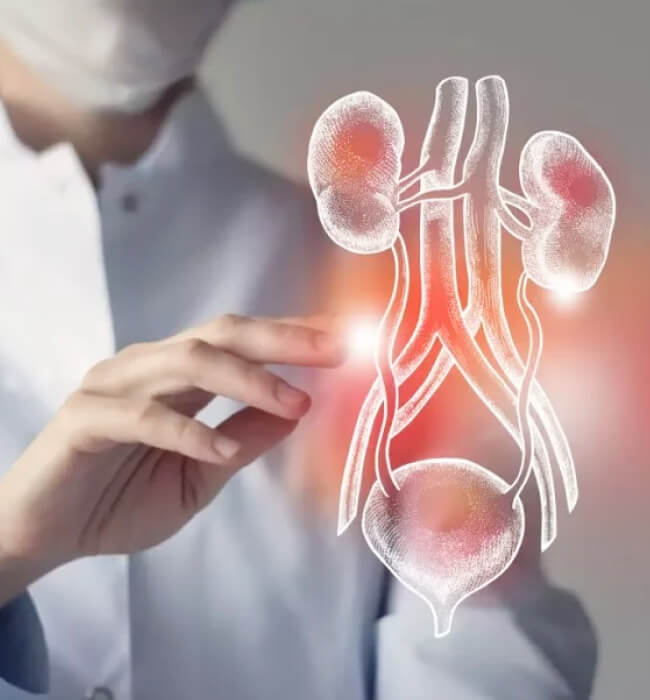Acute Kidney Injury
Acute Kidney Injury Specialist
Acute Kidney Injury (AKI) is a serious condition that can cause permanent organ damage if not treated quickly and appropriately. Dr. Gura is a leading kidney specialist, offering advanced, state-of-the-art treatment for patients in and around Beverly Hills, California who suffer from AKI.
Table of Contents
Toggle
Timely Care for Sudden Needs
Acute kidney injury can have an onset of only a matter of hours and requires immediate attention. We work closely with patients to diagnose AKI and determine the patient’s specific cause for it. We go beyond initial treatment and provide lasting support to control future concerns as well. With follow-up visits and in-depth patient education, we aim to help minimize the impact AKI can have on your life.
Comprehensive Health Solutions
Our approach to helping patients manage AKI involves a holistic approach to their health. We look at each factor that contributed to the condition and build a care plan around them. From routine testing to adaptive treatments, we stay by our patients’ sides to reduce their risk of future complications. Always feel free to request additional information and ask any questions you might have. We are there for you and we listen.
Importance of Kidney Health
Our kidneys handle much of the waste removal from our blood, in addition to producing urine. These organs help manage the levels of substances in the blood, which can impact health factors ranging from blood pressure to immune system function. Through timely and effective care of acute kidney injury, patients take a step toward seeing overall improvements in health and well-being.
Acute Kidney Injury Q & A
Acute kidney injury or AKI occurs when your kidneys suddenly stop functioning the way they should. Also called acute renal failure, AKI can cause serious medical problems if not treated quickly and appropriately.
AKI usually occurs as a result of three main causes: a blockage in the tubes that normally allow urine to drain from the kidneys, sometimes caused by formation of kidney stones or tumors, or an enlarged prostate gland; a sudden decrease in blood flow to the kidneys, often as a result of injury, severe dehydration or widespread infection called sepsis; or damage caused by exposure to poisons, untreated kidney infections or long-term use of some medications, including antibiotics, pain medications and certain blood pressure medications. Dyes used in certain types of imaging tests can also cause AKI.
Also, several risk factors have been associated with acute kidney injury, including older age, obesity, recent heart or belly surgery or bone marrow transplants, being in the ICU with a serious illness, and long-term chronic diseases like heart disease, heart failure, diabetes, or kidney or liver disease.
Also, several risk factors have been associated with acute kidney injury, including older age, obesity, recent heart or belly surgery or bone marrow transplants, being in the ICU with a serious illness, and long-term chronic diseases like heart disease, heart failure, diabetes, or kidney or liver disease.
AKI can cause an array of symptoms, including producing very little or no urine when trying to urinate; swelling in the legs and feet or elsewhere; lower back pain just below the ribcage; loss of appetite; nausea and vomiting; and fever. In its very early stages, AKI can be difficult to detect, with few noticeable symptoms developing before damage has occurred.
Diagnosis of AKI begins with a discussion of your symptoms and a medical history, including a list of all medications and supplements you’re taking. A physical exam will be performed along with urine tests and blood tests. Ultrasound may also be performed to obtain images of your kidneys. Once AKI has been diagnosed, treatment will be based on the underlying cause of the injury, which may include cessation of medications known to cause kidney problems, restoration of normal blood flow to the kidneys, procedures to remove blockages, antibiotics to treat infection and other approaches. If the symptoms are severe, dialysis may also be ordered to remove built-up wastes that accumulate when kidneys are not working properly.
Acute Kidney Injury Risk Factors
Kidney health is closely tied to the health of the body as a whole. Most patients who experience AKI will have it tied to another medical condition or health concern. Some of the most common risk factors for developing AKI include:
- Older age
- Heart and circulation issues
- Diabetes
- Kidney or liver disease
- Obesity
- Trauma
- Infections
- Dehydration
Treat AKI Today
Give your kidneys the care they deserve by working with an experienced kidney specialist. From managing acute kidney injury to providing routine exams, Dr. Gura is proud to provide exceptional medical care to his patients centered in Los Angeles.

